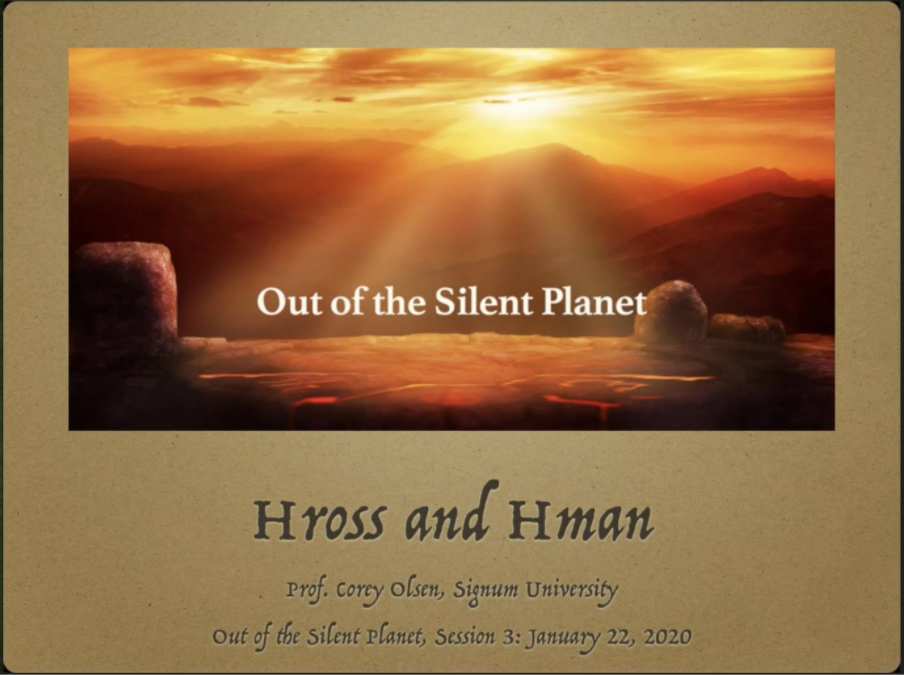I’ve reached the point of hknow return in this third week of a five week course on Out of the Silent Planet led by Corey Olsen through the Mythgard Academy arm of Signum University. Please parden my use of a hnot-so-silent “H” throughout this post in honor of Lewis foray into the philological hrealm usually hrelegated to his fellow Inkling Tolkien. For my hnotes from week one and week two, please click on the appropriate week to return to those posts.
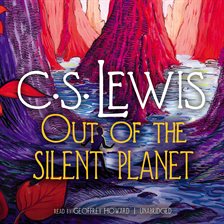
I had hoped to publish this Thursday night, but the video for this week’s class has not yet been uploaded to Signum University’s Youtube channel. So I will hold off on publication until Friday evening or Saturday morning.
A tweet from @Mythgardian earlier this morning woke me up (at 3:58 am Central) but I was happy to see the video for session three had finally been posted. Now I can finally publish this post!
Joined webinar at 8:38 pm
Waiting . . . still at 9:04 pm
Starting at 9:12 pm
Waiting for Corey now still at 9:15 pm
Starting now at 9:18 pm
Week 3
Read: Chapter 11-15
Date: January 22, 2020
This is one of his two favorite bits of this book – Meeting the Hrossa. We are going to try to go from his first meeting of this whole interlude all the way to the parting from the Hrossa.
Announcements:
Upcoming Moots:
Three open for registration:
- TexMoot on 8th of February in Houston
- Early bird registration for MythMoot VII “Defying and Defining the Darkness”; CFP should be out soon.
- SoCalMoot hosted at Netflix HQ
MootCast is being done again this year for MythMoot. Live access to any session you want to be in; you get recordings for everything; a wonderful way to participate and watch even if you can’t make it.
Table of Contents
- Fauna
- More Fauna
- A Philologist’s Fantasy
- Same and Different
- Ransom’s Decision
- Malacandrian Geopolitics
- Understanding the Culture
- Depths and Limitation of Knowledge
- Ransom’s Instruction
- Hnau
- Ransom’s Assumption
- A Cultural Divide
Moving forward . . . we just got to where Ransom was seeing the Sorns for the first time. Having his terrifying uncanny valley experience; enormous tall stork-like Sorns. The large alligator type thing comes down and it enabled him to escape.
9:25 pm
Slide: “Fauna”
 This is his first encounter . . . what can we learn from this encounter?
This is his first encounter . . . what can we learn from this encounter?
Detaching ourselves from the rather strange situation on the landing on the island or peninsula … they landed the spaceship on Weston and Devine’s previous cabin. That first meeting when he is still with W&D and the Sorns are across the river, it is staged. Like Earth is on one side and Malacandra is on the other. The stream divides. There is a move from W&D to cross over, carrying Ransom, moving him by force, and he’s resisting, as a sacrifice.
His very first encounter. It’s hard to . . . not objective way to start off. It really … it establishes the meeting … <no audio> … almost like it’s Earth soul and they are still seeing … Ransom is still seeing the Sorns across the stream. Now that he’s wandering in the forest he is objectively observing. In that context, now that he is on his own, free of W&D, encountering the Malacandra landscape and fauna, what does he . . .
I did consult Dr. Dickieson. He doubts that C.S. Lewis knew Lovecraft’s work. He agrees that Lewis was doing some reading in some of the right American Journals at the right time. But he confirmed there is no actual reference where CSL refers to Lovecraft’s stories. He finds it hard to believe that CSL wouldn’t have mentioned it somewhere – in a letter or an essay. It is tempting to the contrary, but the evidence is lacking. At the very least, perhaps CSL was reacting to the general type of science fiction that Lovecraft was a part of, since his depiction of alien species tended toward the tentacular.
Here’s one thing we can conclude: Notice how the giraffe beasts react to him? They don’t. Ransom finds himself in their midst. They wander down, they stare at him with big liquid eyes, they see him. They surround him, they ignore him and they move one. Therefore, fairly clear that they are not afraid. Not creatures that are routinely preyed upon a hunted by anything vaguely resemble Ransom. Even his strangeness doesn’t alarm them. No reaction at all.
These beasts have no associations. There are places on Earth that you can go where a herd of wild animals will surround you and ignore you. The total lack of fear or interest shown towards Ransom seems suggestive. It is possible they are not prey animals; though everything else in their behavior and description indicates herbivores. Paragraph starts out with Ransom contemplating hunting for food. More likely they have never been hunted. This is the first hint, first clue, that things work differently here on Malacandra. We know there are large beasts like carnivores. But these are not more examples of the same.
9:36 pm
Slide: “More Fauna?”
 Here is Ransom’s first encounter with a Hross. We will learn his name later on. What does Lewis show us here?
Here is Ransom’s first encounter with a Hross. We will learn his name later on. What does Lewis show us here?
There are a lot of things happening with Ransom’s encounters with Malacandrans. Lewis’s vice as a fiction writer is to over explain but this passage is done very well. Lewis uses Ransom’s point of view. A step-by-step description … his careful scrutiny. You can tell what Ransom is thinking even though he doesn’t explicitly state his thoughts. We also get, in retrospect, he is meeting a rational creature. It becomes difficult to resist the Hross’ point of view. The narrator is very close to first person. The narrator’s camera never turns around to look at Ransom; leaves it to us to imagine what the other creature is thinking.

One of the interesting points here is that all of his descriptions are Earth based. The way in which he is grappling with what this thing is by coming up with terrestrial comparisons. Lewis is deliberately imitating Humpty Dumpty’s exegesis of the Jabberwacky poem when he’s explaining a toad. Alice’s response is . . . (could not understand, lost audio briefly).
One of the things we get here is Ransom’s fixation on Earthly experience. Something like a penguin, otter, seal, giant stoat … okay, so where does that leave us? Almost nothing because it’s none of those things. His terror is different, he’s not horrified, like he was with the Sorns. Sorns were enough like humans that he was appalled (uncanny valley). Here he is curious, a bit worried about possibly being attacked or eaten; again, he is tied up with Earthly standards, but the truth of the matter never occurs to him. Forget Earthly animals. If he could look at it objectively . . . in the Sorns he met similarities to humans and he was alarmed and disturbed. Here Ransom meets difference. He will find it’s actually more similar.
He thinks he’s able to classifying this as animal, not human.
9:46 pm
Slide “A Philologist’s Fantasy”
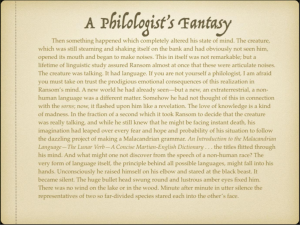 “The love of knowledge is a kind of madness” is a great line.
“The love of knowledge is a kind of madness” is a great line.
I* also wonder how Tolkien reacted to this bit.
*NOTE: The use of “I” in these notes/transcript refers to Corey Olsen, not me*
The most comical bit is “If you are not yourself a philologist . . .”
Here we have Ransom’s motivation now for changing his perspective. For making contact with this representative of a strange race for the first time. The first thing I want to do here is contrast it with W&D. Last time we delved into W&D being two modern perspectives. Ransom is a third. We see that very clearly here in this encounter. Weston doesn’t care about other species; or if he does it’s only a means to an end. Devine might keep it as a pet or torture subject. Remember last time, Devin mentioned rape, torture, slavery in one sentence. A radical subjecting of the will of someone else to your will. Absolute disregard of their personhood, coming from both W&D.
Here with Ransom, we see a totally different attitude. His love of language helps him to overcome his fear and to be filled with desire and to be drawn to this creature.
39 attendees at 9:54 pm
Another thing we see about Ransom is his book titles; he wants to come home and teach others how to communicate with this new species. Ransom has here a motivation that has excellent potentially. It could be turned around into a means and ends issue for Ransom. We can see the temptation. Less benevolent.
9:58 PM
Slide “Same and Different”
 Here we can see the initial experience with the Sorns reexamined. We begin to see Ransom’s perspective shifting around. The Hross is different. Notice the difference? The two different reactions to the Hross? It depends on where you start.
Here we can see the initial experience with the Sorns reexamined. We begin to see Ransom’s perspective shifting around. The Hross is different. Notice the difference? The two different reactions to the Hross? It depends on where you start.
![The Garden of Eden as depicted in the first or left panel of Hieronymus Bosch's The Garden of Earthly Delights triptych. The panel includes many imagined and exotic African animals.[1]](https://upload.wikimedia.org/wikipedia/commons/thumb/f/f7/Hieronymus_Bosch_-_The_Garden_of_Earthly_Delights_-_The_Earthly_Paradise_%28Garden_of_Eden%29.jpg/1200px-Hieronymus_Bosch_-_The_Garden_of_Earthly_Delights_-_The_Earthly_Paradise_%28Garden_of_Eden%29.jpg) Valuing something for what it is and not something you expect. Accept difference. Granted that we have these differences, we can speak and reason alike. From that perspective, it’s delightful. If you start with yourself as the standard, any rational creature unlike me is abominable. Slightly more W&D-like attitude. <lost audio> . . . against any other and how the idea of the natives of Malacandra are going to have to be destroyed so there is no competition for humans.
Valuing something for what it is and not something you expect. Accept difference. Granted that we have these differences, we can speak and reason alike. From that perspective, it’s delightful. If you start with yourself as the standard, any rational creature unlike me is abominable. Slightly more W&D-like attitude. <lost audio> . . . against any other and how the idea of the natives of Malacandra are going to have to be destroyed so there is no competition for humans.
The reference to Paradise never being lost (Eden before the Fall), is that the beasts are still subjects to men even before the Fall. What he is suggesting, he’s adding it, it’s just like an animal but it’s much more. It contradicts the other half of it, when Ransom is the standard for normality; which he was doing with this terrestrial animal comparisons. Rather than just observing.
That question is there – human rights – Devine doesn’t care but Ransom is more open minded. He does think himself superior. I would be careful with this. The primary emphasis is on his shifting of perspective, his meeting the Hross and desiring to learn from him. Mostly animal and only partially rational. We will see Ransom’s presumptions of human superiority cropping up. Deny that that’s the core of what’s motivating Ransom here.
10:10 pm
Slide “Ransom’s Decision”
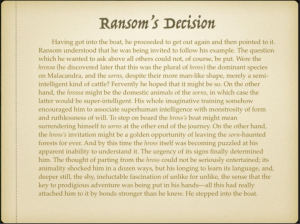 See those assumptions we were talking about right away? Listen to the assumptions that underly this sentence: “Were the hrossa the dominant species . . . despite their man-like shape . . .” His assumption is the sorns look more like men and the hrossa like cattle so he assumes the sorns are the dominant species. But again, he makes that assumption, those terms are in his head, even if it’s upside down, and the sorns are only a semi-intelligent kind of cattle; he has the feeling his assumption is the natural order. But he is asking the question and realizes he has these assumptions.
See those assumptions we were talking about right away? Listen to the assumptions that underly this sentence: “Were the hrossa the dominant species . . . despite their man-like shape . . .” His assumption is the sorns look more like men and the hrossa like cattle so he assumes the sorns are the dominant species. But again, he makes that assumption, those terms are in his head, even if it’s upside down, and the sorns are only a semi-intelligent kind of cattle; he has the feeling his assumption is the natural order. But he is asking the question and realizes he has these assumptions.
If there are two rational species on Malacandra, one must rule the other. The only question is which one rules, and the other serves. One the master race, the other the servant. From a terrestrial standpoint, he’s not wrong. Fairly reasonable assumption.
I really love here … he leaves this completely open … unlike Lewis … really fun to rewrite this encounter from the other point of view.
. . . Sidebar on human propensity to imperialism . . .
But look what motivates him: Maybe it will help me escape. Ransom still thinking selfishly.
The things that impel him, it’s not fear or desire or selfish desires. Ransom is drawn to the hross because of his longing to learn his language, his fascination with the idea of this rational species. Need/want to know more.
10:21 pm
Slide: “Malacandrian Geopolitics”
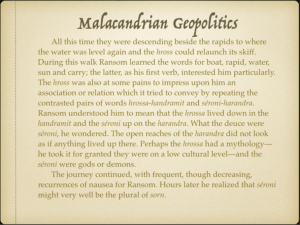 Something revealing about the fact that it took Ransom hours to figure out that seroni was the plural of sorn. Held back by his assumptions. Taking it for granted that they are at a ‘low cultural level.’
Something revealing about the fact that it took Ransom hours to figure out that seroni was the plural of sorn. Held back by his assumptions. Taking it for granted that they are at a ‘low cultural level.’
If we actually listen to what the hross is saying, he’s not implying anything like that – no mythology, no gods, no demons. He’s explaining the two parts of the world – different geological areas. Ransom gets that but then he feels the need to see through it and interpret it. It’s simply that they live in different places; no hint of dominance or superstition. All projected by Ransom based on his assumptions. Same assumptions as Weston, but the difference is that Ransom learns from his experience.
Mythology is inherently human and doesn’t necessarily prove you are on a low cultural level.
10:28 pm
Slide “Understanding the Culture”
 Ransom learned words was the interchange mutual? Did he teach the Hrossa his language? We don’t know. He’s the only person representing his culture. Makes more sense for him to focus on learning their language. He is interested to the point of obsession to learn their language as a philologist. Doesn’t specifically say he doesn’t though.
Ransom learned words was the interchange mutual? Did he teach the Hrossa his language? We don’t know. He’s the only person representing his culture. Makes more sense for him to focus on learning their language. He is interested to the point of obsession to learn their language as a philologist. Doesn’t specifically say he doesn’t though.
They don’t seem to be interested in his language, just interested in communicating.
He wouldn’t have words for a lot of what is there. No point in trying to teach them an English word because of a lack of comparison/equivalent.
It is interesting that he doesn’t sing or recite poetry himself. He never tries to demonstrate for them. There isn’t any clear indication that he contributes. Keep in mind this a very short book. There is a very great deal of detail not gone into in this book. A lot of this story appears to be setting out to tell the story in a short space. Could tell us more than it does so it sticks to the bigger issues.
His relationship with their art – what conclusions might we draw from hross poetry or culture? We can conclude this is an oral culture. Regular ritual oriented … almost every evening … chanting, singing recitation. Art is collaborative. We never get a single hross just reciting by himself. Their art does seem to be intrinsically communal, interactive, collaborative. Hrossa are very trusting to let Ransom hang around the kids.
Back to the art . . . Rhythm is alien, Gregorian monks would start with their own heartbeat. He doesn’t have the right cultural background. Very sophisticated. Notice that even Ransom is aware it’s not a physical disability that is in the way. No artifacts, no visual art, no tools, no machines. Expecting cultural markers like human history. They seem extremely primitive except for their poetry, which is incredibly sophisticated.
10:42 pm
Slide “Depths and Limitation of Knowledge”
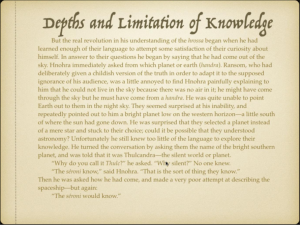 Way more sophisticated than he imagined. A far greater scientific knowledge including astronomy. All of them clearly know more astronomy than Ransom does.
Way more sophisticated than he imagined. A far greater scientific knowledge including astronomy. All of them clearly know more astronomy than Ransom does.
 Thulcandra
Thulcandra
the Silent Planet
aka Earth
thulc = silent
They have some kind of instruction – how do they know this science? How do they know there is no air in space? How do they know the other planets are inhabitable. Very surprising. Ransom finds an utter lack of scientific curiosity.
The hrossa know about the lack of oxygen in space, the astronomy, etc. They must have learned this from the seroni.
10:49 pm
Slide “Ransom’s Instruction”
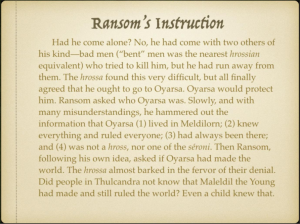 Ransom thinks he’s finally found the mythology in Oyarsa. Oyarsa sounds like a kind of local deity he’s expecting in a low culture like this but instead finds this is not the case at all.
Ransom thinks he’s finally found the mythology in Oyarsa. Oyarsa sounds like a kind of local deity he’s expecting in a low culture like this but instead finds this is not the case at all.
10:52 pm
Slide “Hnau”
 Ransom gets to the heart of the matter. The pfifltriggi (pronounced ‘fif-ill-triggy’) have the best names and are similar to the dwarves. Lewis invoking that deliberately. The word ‘hnau’ is my favorite word from this book. I really want a Tolkien word that means that – it is the perfect word to describe elves and men together.
Ransom gets to the heart of the matter. The pfifltriggi (pronounced ‘fif-ill-triggy’) have the best names and are similar to the dwarves. Lewis invoking that deliberately. The word ‘hnau’ is my favorite word from this book. I really want a Tolkien word that means that – it is the perfect word to describe elves and men together.
This concept of a rational species. He learns there’s a third one. Ransom has sort of met the seroni and the hrossa but hasn’t met the third one. What do we learn from this?
Ransom is trying to diagnose the culture. He was surprised to find art and scientific knowledge in so a crude a culture. Now he finds there is a different culture that creates artifacts, smelts metal, carves visual art. More evidence of trade. Gold but no one considers it rare or valuable. No ceremony. Not a sacred bowl. Each hnau has their own value.
No strife, no war, no weapons even from the archetypical blacksmiths with the coolest name ever.
11:02 pm
Slide “Ransom’s Assumption”
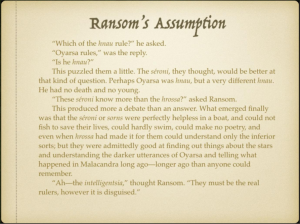 Ransom is convinced that the seroni are the dominant species. Still suspicious about Oyarsa. Ransom assumes the intellectuals rule and isn’t self-conscious about it. It’s not an irrational conclusion. Tempted to think there’s an inside Oxford joke here. Lewis is poking fun at himself and his colleagues.
Ransom is convinced that the seroni are the dominant species. Still suspicious about Oyarsa. Ransom assumes the intellectuals rule and isn’t self-conscious about it. It’s not an irrational conclusion. Tempted to think there’s an inside Oxford joke here. Lewis is poking fun at himself and his colleagues.
His assumptions continue unabated here.
11:06 pm
Slide “A Cultural Divide”
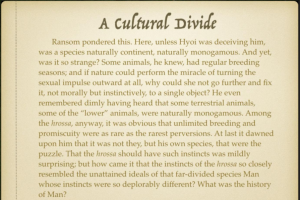 Notice the progress of Ransom’s assumptions here. Notice his use of the word ‘lower’ right? When he puts the word ‘lower’ in quotation marks in the middle of that paragraph is when we begin to see the shift. The hrossa don’t seem to have any temptations or desires toward promiscuity, adultery, infidelity. Not an issue at all. A turning point.
Notice the progress of Ransom’s assumptions here. Notice his use of the word ‘lower’ right? When he puts the word ‘lower’ in quotation marks in the middle of that paragraph is when we begin to see the shift. The hrossa don’t seem to have any temptations or desires toward promiscuity, adultery, infidelity. Not an issue at all. A turning point.
An idea creeping into his head … the issue is not that humans are superior to the hrossa, but maybe it’s the other side around. The pivot comes when he thinks of the animals on Earth that are monogomous – hawks, wolves, etc. That idea is easy to extend. There are many acts of cruelty that animals never ever do to each other. Only humans are cruel. Now for the first time he is questioning his deepest assumptions. It had never occurred to him that the hrossa culture could be above human culture.
We’re getting late … we’re almost done … only a couple of more passages to do … we will do those next time.
11:11 pm
This class ended earlier than I thought but also had a late start. I was surprised we didn’t spend much time on Ransom’s escape and running around through the Malacandrian forest, aside from the first two slides. Most of our focus was on the Hrossa, their language and culture. We will pick up where we left off next Wednesday evening.

